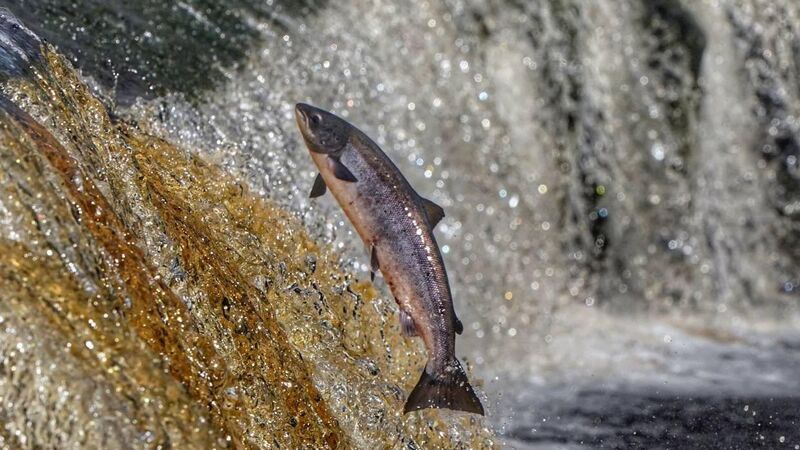Knowledge is key: Concerns about future of Irish salmon

Smoked salmon gives everything a whole extra layer of delectability, which of course is why traditionally Irish smoked wild salmon was always a sought-after and expensive delicacy, especially at Christmas.
I began to think about the Irish salmon itself.
An bradán, as it is called in Irish, is an icon of our Celtic heritage and culture. According to legend, one awe-inspiring salmon even acquired the wisdom of the universe.
That salmon became known in legend and story as the Salmon of Knowledge, or An Bradán Feasa.
As a child, I learned how a young Fionn Mac Cumhaill ate some of that salmon and from it gained the incredible knowledge and wisdom that, in time, led to him becoming the chief of the Fianna, the famed warrior heroes of Irish myth.
The Salmon of Knowledge is the wisdom figure of Irish mythology. It is, in folklore and legend, the king of fish. And it is ours.
Yet, look at the current plight of An Bradán Feasa.
As the only fish whose life cycle demands transition from the salt water of the sea to the fresh water of our rivers, the salmon has suffered hugely from the pollution of Ireland’s inland waterways and the decimation of the gravel beds which were formed millennia ago and are crucial to the spawning cycle.
Many salmon fishermen have hung up their rods in despair because of the plummeting numbers of wild salmon in our rivers.
The salmon farming industry is probably something that most of us never consider at all, simply because it’s all done underwater.
Salmon Watch Ireland, a lobby group which has for a long time been concerned about the decline in Irish wild salmon, has fought to highlight its concerns about the effects of salmon farming on both farmed and wild salmon.
I rang the organisation’s chairman, John Murphy. He claimed that some salmon farming cages could have upwards of 200,000 fish in them. If that is the case, think about that kind of crowded, restricted existence for a wild creature which in nature freely traverses many thousands of miles across open ocean.
Hundreds of thousands of farmed salmon can be caged in just an area of a bay or in the lee of an island, claimed Murphy, and they can be prone to sea lice from adjacent farms or from passing wild salmon and sea trout.
Mortality rates in some farms can be very high, he says, stating that Salmon Watch is aware of rates as high as 84% in the sector.
Factors include disease, sea lice, or harmful algal blooms, which negatively affect the oxygen in the water. Jellyfish can invade the cages, clogging the gills of the fish.
Last, but not least, mortality is linked to warming sea temperatures, which in turn, he explains, aggravate the existing problems.
Cage design, Murphy insists, is not properly legislated for, and the organisation believes that there’s no no real government focus – nor indeed any focus from the general public - on the health of farmed fish, which Salmon Watch claims is now a major animal welfare issue.
The government and the public - and not just Salmon Watch - should be concerned, he argues.
The group is also deeply worried about the effects of salmon farming on wild salmon and sea trout populations. “Juvenile wild salmon and wild sea trout pick up sea lice and disease as they are passing salmon farms on their migration route, or they come into contact with sea lice larva drifting in the ocean adjacent to farms,” he explains.
“The young salmon travel far, passing out of infected water around the Irish coast en route to their feeding grounds in the Norwegian sea.
“During their migration, they may also become infected by sea lice when passing farms in Scotland and the Norwegian coast,” added Murphy.
Research shows open cage salmon farming can have a “dramatic” effect on wild salmon and sea trout in the area, he warns.
The health of Irish sea trout, which don’t migrate long distances, but remain mostly around the Irish coast, is another cause of concern.
“There are indications that Irish sea trout remain in coastal areas and are badly impacted by sea lice and disease from cages around the coasts,” said Murphy.
I got on to one of the companies involved in the industry, Mowi Ireland, the world’s largest supplier of farm-raised salmon, and which has farmed salmon in Ireland for more than 44 years.
I asked Catherine McManus, the company’s Operations Director Farming (Ireland), about the various allegations made by Salmon Watch Ireland. Her answer was that, as salmon were the foundation of this business, their health and wellbeing were the drivers of its success.
“We understand that they are sensitive to their environment and only prosper in clean and well oxygenated waters,” she said. “It is therefore in our interest to ensure that is how they are farmed.
“The control protocols in respect of sea lice operated by the Marine Institute on behalf of the State are more advanced than those operated in other jurisdictions and are widely accepted as representing best practice internationally.
Reassuring words.
Even so, as many of us prepare to tuck into salmon this Christmas, it’s worth asking whether the public and government are aware of the debates around where they come from, and that the numbers of wild salmon have fallen so drastically.







 App?
App?




